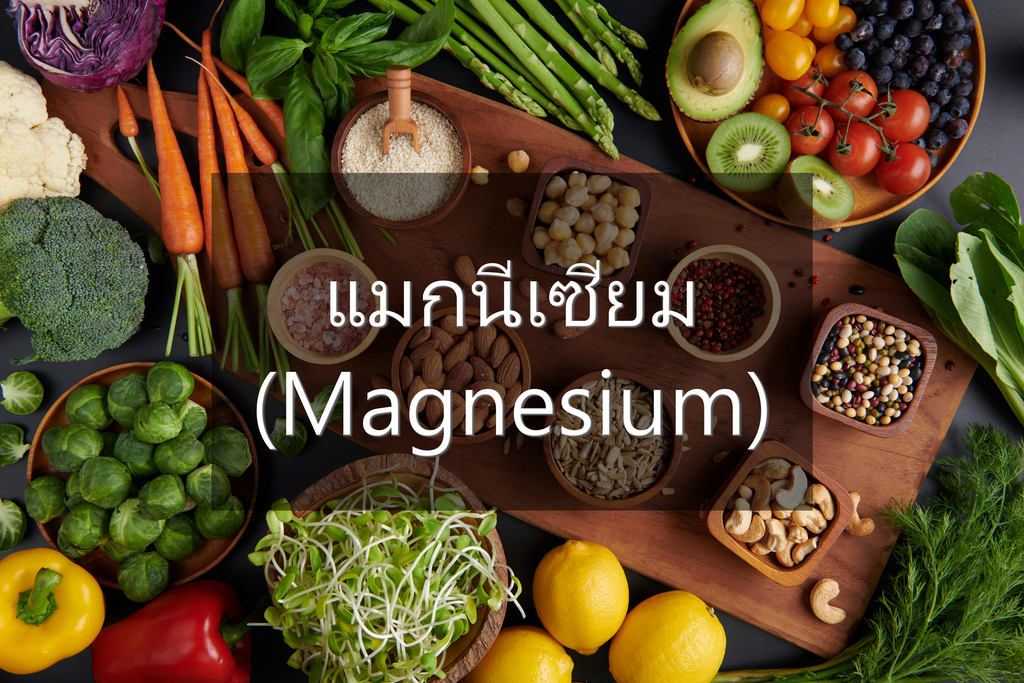Benefits of Magnesium

Magnesium is an important micronutrient for the human body and there are several important benefits when consuming enough magnesium-rich fruits and vegetables in our diet:
- *Maintains the nervous system: Magnesium plays a role in nerve signaling and muscle control. Supplementing magnesium in the diet may help reduce symptoms of anxiety in some cases.
- *Promotes head function and learning: Getting enough magnesium can help improve brain function and learning. Magnesium plays a role in neurotransmission and learning.
- *Regulating the heart and blood vessels: Magnesium is important in regulating the heart and blood vessels. Magnesium deficiency can cause discomfort and increase your risk of heart disease.
- *Maintains the muscular system: Magnesium helps muscles function normally. Magnesium deficiency can cause weakness. or stimulate the muscles without control
- *Maintains the immune system: Magnesium plays a role in keeping the immune system functioning properly. Magnesium deficiency can prevent the immune system from working properly.
- *Reduces the risk of blood vessel disease: Magnesium helps control blood vessel constriction. This reduces the risk of high blood pressure and other vascular diseases.
- *Promotes healthy bones and teeth: Magnesium helps with calcium absorption. Makes bones and teeth strong
- *Prevention of inflammation: Magnesium is important in the process of preventing inflammation in the body.
- *Aids in the digestive process: Magnesium helps in the release of enzymes important for digestion in the stomach.
- *Reduces stress and depression: Magnesium plays a role in creating neurotransmitters that promote relaxation and reduce stress.
The balance of magnesium in the body should be maintained to maintain good health. Consuming enough fruits and vegetables that contain magnesium is a good way to benefit your body from this nutrient and prevent magnesium deficiency in the body.
Here are some fruits and vegetables that are high in magnesium:
vegetable:
- 100 grams of spinach is rich in 79 milligrams of magnesium.
- 100 grams of Swiss Chard is rich in 81 milligrams of magnesium.
- 100 grams of Collard Greens is rich in 27 milligrams of magnesium.
- 100 grams of Kale is rich in 29 milligrams of magnesium

- 100 grams of Bok Choy is rich in 13 milligrams of magnesium.
- 100 grams of Mustard Greens is rich in 32 milligrams of magnesium.

- 100 grams of broccoli is rich in 21 milligrams of magnesium.
- 100 grams of water spinach is rich in 71 milligrams of magnesium.

- 100 grams of lettuce (Arugula) is rich in 47 milligrams of magnesium.
- 100 grams of cilantro leaves is rich in 26 milligrams of magnesium.
fruit:
- 100 grams of apple is rich in 5 milligrams of magnesium.
- Orange (100 grams) is rich in magnesium 11 milligrams.
- 100 grams of Mango is rich in 10 milligrams of magnesium.
- 100 grams of papaya is rich in 33 milligrams of magnesium.
- 100 grams of banana is rich in 27 milligrams of magnesium.
- Pomegranate seeds (Pomegranate) 100 grams are rich in magnesium 34 milligrams.

- 100 grams of lychee is rich in 10 milligrams of magnesium.
- 100 grams of Avocado is rich in 19 milligrams of magnesium.
- Guava (Guava) 100 grams is rich in magnesium 22 milligrams.
- Almonds (Almonds) 1 oz rich in magnesium 80 mg.
Consuming these fruits and vegetables is a good way to get magnesium and should be included in your daily diet to maintain good health and prevent magnesium deficiency in the body overall.




